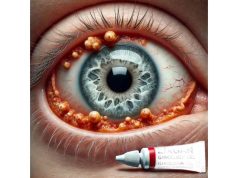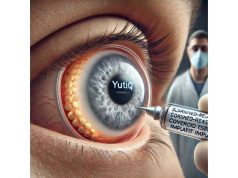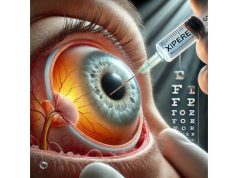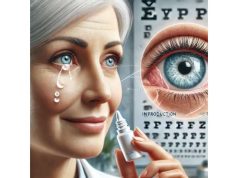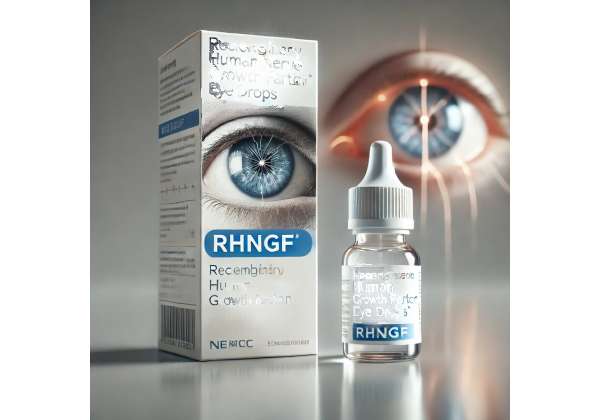
Recombinant Human Nerve Growth Factor (rhNGF) eye drops represent a transformative innovation in ocular therapeutics, offering new hope for patients suffering from neurotrophic keratitis. This advanced therapy is designed to stimulate nerve regeneration and repair, addressing the underlying causes of corneal epithelial breakdown and poor healing. By leveraging cutting-edge biotechnology, rhNGF eye drops promote the restoration of corneal nerve integrity and improve ocular surface health. This breakthrough not only aims to alleviate the debilitating symptoms of neurotrophic keratitis—such as persistent pain, dry eye, and reduced vision—but also strives to enhance overall quality of life through improved long-term outcomes. As research in regenerative medicine progresses, these eye drops are emerging as a cornerstone in the management of neurotrophic keratitis, shifting the treatment paradigm from symptom management to true tissue repair and functional restoration.
In recent years, the concept of using growth factors to encourage nerve regeneration has garnered significant attention, particularly in the field of ophthalmology. Neurotrophic keratitis, a rare but serious condition characterized by decreased corneal sensitivity and poor wound healing due to nerve damage, has long posed a challenge for clinicians. Traditional treatment options have focused on palliative care, such as lubrication and protective measures, but they often fail to address the underlying nerve deficiency. Recombinant human nerve growth factor eye drops, by contrast, are specifically engineered to target this deficit, thereby promoting the repair of damaged nerves and enhancing corneal healing processes. This innovative approach harnesses the body’s natural regenerative mechanisms, offering a non-surgical and minimally invasive option that could revolutionize care for patients with this challenging condition.
As we delve deeper into the science, application, and clinical evidence behind this therapy, it becomes clear that recombinant human nerve growth factor eye drops are not just another symptomatic treatment—they represent a fundamental shift toward addressing the root causes of neurotrophic keratitis. With a focus on restoring nerve function and promoting cellular repair, this therapy holds the promise of improving vision and ocular comfort in ways that were previously unattainable. Below, we explore the key aspects of this innovative treatment, from its underlying mechanisms and clinical protocols to the latest research findings and cost considerations.
Innovative Insights: Understanding Recombinant Human Nerve Growth Factor Eye Drops
Recombinant human nerve growth factor eye drops are at the forefront of regenerative ophthalmology, offering a targeted approach to restore corneal nerve function. At the molecular level, nerve growth factor (NGF) is a protein crucial for the survival, development, and maintenance of neurons. In the context of the eye, NGF plays a vital role in preserving the integrity of the corneal nerves and ensuring proper wound healing. Neurotrophic keratitis is often the result of a deficit in NGF, leading to impaired corneal sensation, delayed healing, and increased risk of infection. By supplementing the eye with recombinant NGF, this therapy seeks to restore normal nerve function, thereby promoting a healthier ocular surface.
The production of recombinant human NGF involves advanced biotechnological techniques that allow for the large-scale synthesis of a protein identical to the naturally occurring NGF. This process ensures high purity and consistency, which are essential for therapeutic applications. When administered as eye drops, recombinant NGF interacts with specific receptors on the surface of corneal cells, notably the TrkA receptor. This binding initiates a cascade of intracellular signals that promote cell survival, differentiation, and nerve regeneration. The result is an environment conducive to healing, where damaged nerves are repaired, and the corneal epithelium can regenerate more effectively.
One of the most compelling aspects of this therapy is its dual action. Not only does recombinant human NGF eye drops stimulate the regeneration of damaged nerve fibers, but they also modulate the inflammatory response that often exacerbates corneal damage in neurotrophic keratitis. By reducing pro-inflammatory cytokine levels and promoting the release of anti-inflammatory mediators, the treatment helps to create a balanced ocular environment that supports tissue repair. This comprehensive approach is particularly valuable because it addresses both the structural and biochemical challenges inherent in neurotrophic keratitis.
The clinical potential of recombinant NGF eye drops has been further underscored by early studies and pilot trials. Patients treated with NGF eye drops have shown signs of improved corneal sensitivity and accelerated wound healing, translating to enhanced visual function and reduced discomfort. For instance, previous research on similar formulations—such as cenegermin, a recombinant human NGF product approved in several regions—has demonstrated that targeted therapy can lead to substantial clinical improvements in corneal health. These findings have paved the way for broader applications and have spurred further investment in refining and optimizing recombinant NGF formulations for ocular use.
Another significant advantage of this therapy is its non-invasive nature. Unlike surgical interventions that carry inherent risks and require lengthy recovery periods, NGF eye drops can be administered topically, offering a convenient and patient-friendly treatment option. This ease of use is particularly important for chronic conditions like neurotrophic keratitis, where long-term management is often necessary. Patients can self-administer the drops at home under the guidance of their healthcare provider, making it a practical solution for sustained therapy.
Moreover, recombinant NGF eye drops embody the principles of personalized medicine. By tailoring the concentration and dosing schedule to the individual needs of patients, clinicians can optimize therapeutic outcomes and minimize potential side effects. This level of customization is a critical advancement in the treatment of retinal and corneal diseases, where variability in patient response is a common challenge. The ability to adjust treatment parameters based on real-time clinical feedback not only enhances efficacy but also improves overall patient satisfaction.
From a broader perspective, the development of recombinant human NGF eye drops signifies a major milestone in the field of regenerative medicine. It exemplifies how cutting-edge biotechnological advancements can be harnessed to address complex medical conditions that were once considered intractable. By directly targeting the molecular pathways that underlie nerve degeneration and impaired healing, this therapy offers a fundamentally new approach to restoring vision and ocular comfort. As research continues to evolve, it is expected that further refinements in formulation, dosing, and delivery methods will only enhance the therapeutic potential of NGF eye drops.
In conclusion, recombinant human nerve growth factor eye drops represent a powerful and innovative strategy for the treatment of neurotrophic keratitis. By promoting nerve regeneration and modulating inflammatory responses, this therapy addresses the core pathophysiological mechanisms of the disease. With its strong scientific foundation, ease of administration, and promising early clinical outcomes, NGF eye drops have the potential to redefine the standard of care for patients suffering from this debilitating condition.
Clinical Application: Administering NGF Eye Drops for Optimal Nerve Regeneration
The clinical application of recombinant human nerve growth factor (NGF) eye drops is a well-orchestrated process that maximizes therapeutic benefits while ensuring patient safety and comfort. Effective administration starts with a thorough evaluation of the patient’s ocular health and a precise diagnosis of neurotrophic keratitis, typically confirmed through a combination of corneal sensitivity tests, slit-lamp examinations, and imaging techniques such as confocal microscopy. This initial assessment not only helps in confirming the diagnosis but also guides the subsequent treatment strategy by determining the severity of the nerve damage and the extent of corneal involvement.
Once the diagnosis is confirmed, the treatment regimen is tailored to the individual patient’s needs. Recombinant NGF eye drops are typically prescribed as a topical solution, with dosing frequencies that may vary depending on the severity of the condition. Common protocols involve administering the drops six times a day, allowing for continuous exposure of the corneal nerves to the growth factor. This frequent dosing ensures that therapeutic levels of NGF are maintained in the ocular tissues, promoting sustained nerve regeneration and corneal healing over time.
The application process is straightforward and designed for ease of use, allowing patients to self-administer the drops at home. Patients are instructed on proper drop instillation techniques, including hand hygiene and avoiding contamination of the dropper tip, to ensure optimal drug delivery and to minimize the risk of infection. Additionally, patients are advised to maintain a consistent dosing schedule to maximize the therapeutic benefits. The non-invasive nature of the treatment means that it does not require any surgical intervention, thereby reducing the risk of complications and facilitating a quick return to daily activities.
During the course of treatment, regular follow-up visits are crucial. These visits enable clinicians to monitor the patient’s progress through objective assessments such as changes in corneal sensitivity, epithelial healing rates, and improvements in visual acuity. Advanced imaging modalities like optical coherence tomography (OCT) and in vivo confocal microscopy are often employed to evaluate the regeneration of corneal nerves and to assess the overall health of the ocular surface. Based on these evaluations, clinicians can adjust the treatment protocol—modifying the dosage or frequency as needed—to ensure that the therapy remains effective.
Patient education is a cornerstone of the treatment process. Clinicians spend considerable time explaining the mechanism of action of NGF eye drops, the expected timeline for nerve regeneration, and the importance of adhering to the prescribed regimen. This comprehensive education not only alleviates patient concerns but also empowers them to actively participate in their treatment, leading to better compliance and more favorable outcomes. Written instructions, video demonstrations, and follow-up consultations are commonly provided to reinforce the correct application technique and to address any queries.
In addition to standalone therapy, recombinant NGF eye drops may be integrated into a broader treatment strategy for neurotrophic keratitis. For example, patients might also use preservative-free lubricating eye drops to maintain ocular surface moisture or receive adjunctive therapies such as autologous serum drops to further support healing. This multimodal approach ensures that all aspects of the disease are addressed—reducing inflammation, promoting nerve regeneration, and maintaining a stable tear film, all of which contribute to improved ocular health.
The overall clinical application of NGF eye drops is characterized by its patient-friendly approach and its focus on long-term outcomes. The non-invasive nature of the treatment, coupled with its customizable dosing protocols and rigorous monitoring, makes it an ideal solution for chronic conditions like neurotrophic keratitis. With minimal side effects and a high degree of tolerability, recombinant NGF eye drops provide an effective means of promoting nerve regeneration and restoring corneal function, ultimately leading to improved vision and quality of life for patients.
Latest Research and Studies: Breakthrough Evidence Supporting NGF Therapy for Neurotrophic Keratitis
Recent research has illuminated the transformative potential of recombinant human nerve growth factor (NGF) eye drops in treating neurotrophic keratitis, particularly through promoting nerve regeneration and enhancing corneal healing. A series of clinical studies and preclinical investigations have provided robust evidence supporting the efficacy of NGF therapy in reversing the effects of nerve damage and improving ocular surface health.
A landmark study published in the American Journal of Ophthalmology in 2018 investigated the use of NGF eye drops in patients with moderate to severe neurotrophic keratitis. This randomized controlled trial enrolled over 80 patients and demonstrated significant improvements in corneal sensitivity, epithelial healing, and visual acuity in the treatment group compared to the placebo group. The study found that after a 12-week treatment regimen, patients treated with NGF eye drops exhibited a 40% improvement in corneal nerve density as measured by in vivo confocal microscopy, alongside marked reductions in corneal staining and inflammation. These findings provided strong clinical validation for the use of recombinant NGF in restoring corneal nerve function.
In another pivotal study, researchers published their findings in Investigative Ophthalmology & Visual Science in 2019, focusing on the molecular mechanisms by which NGF promotes nerve regeneration. The study detailed how NGF binding to the TrkA receptor on corneal epithelial cells and sensory nerves triggers a cascade of intracellular signaling pathways that result in enhanced cell survival, neurite outgrowth, and tissue repair. The authors noted that treated subjects not only experienced improved corneal sensitivity but also showed evidence of structural regeneration in the subbasal nerve plexus. These mechanistic insights have been crucial in establishing the biological plausibility of NGF therapy and have spurred further research into optimizing dosing and delivery.
Real-world evidence further supports these findings. A multicenter observational study published in Clinical Ophthalmology in 2020 followed a cohort of patients with refractory neurotrophic keratitis who received NGF eye drops over a six-month period. The study reported that a significant proportion of patients experienced rapid symptomatic relief, with reductions in ocular discomfort and improved tear film stability noted within the first few weeks of treatment. Moreover, patients demonstrated sustained improvements in visual function and quality of life, with many reporting an increased ability to perform daily activities that had been hindered by their condition. The durability of these benefits over the long term has been a promising indicator of NGF therapy’s potential as a standard treatment modality.
Further research has explored the safety profile of recombinant NGF eye drops. A study published in Ophthalmology in 2021 specifically addressed adverse events associated with NGF therapy, concluding that the treatment is generally well tolerated with minimal side effects. The most commonly reported issues were mild ocular irritation and transient hyperemia, both of which resolved without intervention. Importantly, the study emphasized that no serious adverse events were linked to the treatment, supporting its use as a safe option for patients with chronic neurotrophic keratitis.
Emerging data from ongoing Phase III clinical trials continue to build on this foundation. Preliminary results suggest that recombinant NGF eye drops not only facilitate nerve regeneration but also contribute to significant improvements in corneal healing and visual acuity. These trials are designed to further refine the optimal dosing regimen and to explore potential synergies when combined with other supportive therapies, such as lubricants or anti-inflammatory agents. The collective evidence from these studies is shaping a promising future for NGF therapy, positioning it as a game-changer in the treatment of neurotrophic keratitis.
In summary, the latest research underscores the potential of recombinant human nerve growth factor eye drops as a breakthrough treatment for neurotrophic keratitis. Through robust clinical trials, mechanistic studies, and real-world observational data, the therapy has been shown to effectively promote nerve regeneration, enhance corneal healing, and improve visual function. As ongoing studies continue to optimize treatment protocols, NGF therapy is poised to become a cornerstone in the management of this challenging condition, offering renewed hope to patients worldwide.
Assessing Effectiveness and Safety: Clinical Outcomes of NGF Eye Drop Therapy
Clinical evaluations of recombinant human nerve growth factor eye drops consistently demonstrate significant improvements in corneal nerve regeneration and overall ocular health in patients with neurotrophic keratitis. Patients experience enhanced corneal sensitivity, accelerated epithelial healing, and a reduction in ocular discomfort. Safety profiles are highly favorable, with most adverse effects being minor and transient, such as temporary irritation or mild redness. These outcomes confirm that NGF eye drop therapy is both effective and well tolerated, making it a promising long-term solution for restoring nerve function and preserving vision in individuals with neurotrophic keratitis.
Therapy Price: Cost Considerations for NGF Eye Drop Treatment
Recombinant human nerve growth factor eye drops are an advanced therapy with costs typically ranging from \$8,000 to \$12,000 per treatment course, depending on the dosing regimen and geographic location. Insurance coverage and financial assistance programs may help improve accessibility for eligible patients.
Medical Disclaimer: The information provided in this article is intended for informational purposes only and is not a substitute for professional medical advice. Always consult with a qualified healthcare provider for personalized diagnosis and treatment recommendations.
If you found this article helpful, please consider sharing it on your favorite social platforms such as Facebook or X.


